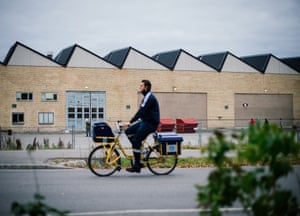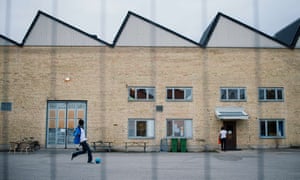Sweden is in the grip of a row over housing for refugees, with private accommodation providers accused of making fat profits while the country struggles to find beds for tens of thousands of asylum seekers before winter.
Housing is so limited for record numbers of arrivals – 9,000 are arriving in Sweden every week – that the authorities are using heated tents to put people up.
But at the same time, private companies have been accused of charging exorbitant amounts to help the government find accommodation for more than 80,000 people who have made it to Sweden this year.
“We are living hand to mouth,” said Tolle Furegård, head of refugee accommodation at Sweden’s migration board, who said the service relies a heavily on the private sector in this situation. “They are not doing this to be nice to us… It is a big sector, a chance to earn lot of money quickly, and it’s safe, because the government pays its bills.”
The board had lowered its standards to attract more offers of accommodation, and is seeking 30,000 more beds by the end of the year – “a huge number”, Furegård said.
The prime minister, Stefan Löfven, has asked company bosses whether it “feels good when you look in the mirror” to be making big profits at a time when the country is pulling together over the refugee crisis.
Migration minister, Morgan Johansson, has decried companies for “lining their pockets” while the rest of Sweden is scraping together money for refugees.
With demand outstripping supply, private companies have seized the opportunity raise prices, according to a spokesman for the justice ministry, which is responsible for immigration.
“The government is highly critical of some reported prices in the private sector, but deems that the short-term need of finding accommodation must take precedent over regulation looking at prices or profits at the moment,” the spokesman said.
More than 86,000 people have applied for asylum in Sweden so far in 2015, already surpassing the previous record of 84,000 for the whole of 1992 during the Balkan wars.
More unaccompanied refugee children will arrive in Sweden this year than in any other EU country. The ceiling on state payments to accommodate children is far higher than that for adults, attracting private investment into a lucrative area with profits three times higher than the average for stock market-listed companies.
Aleris, a large company owned by the powerful Wallenberg family, declined to comment on press reports that it charges as much as SKr84,000 (£6,600) a month to place a refugee child with a foster family.
The company Vardaga, which has come under fierce criticism for standards of elderly care, said accommodation for child refugees involved high personnel costs, long lead-times and a high degree of uncertainty. “All of this adds up to €200 (£150) a day for kids,” said the firm’s CEO, Fredrik Gren. “After three years in the sector we are still not breaking even.”
Jokarjo, the largest private provider of refugee accommodation for adults, has grown explosively. Its owner, Bert Karlsson, says he aims to create an “Ikea for asylum reception” – the company trebled its turnover between 2013 and 2014. Challenged last week by reporter Carolina Neurath over charging the state SKr350 a refugee, Karlsson lost his temper and accused her of being “fucking stupid” to suggest a third of the money was profit.

In an irony not lost on most observers, in 1991 Karlsson launched the anti-immigration New Democracy party in Sweden, a short-lived forerunner of the Sweden Democrats, who last week announced an advertising campaign telling refugees not to come to Sweden because “the country is full”.
The row over making profits from asylum seekers taps into unease in Swedish society about the growing role of the private sector in providing public services, which helped propel a centre-left coalition to power a year ago. Although the minority administration is struggling in the polls, its warm welcome to refugees has struck a chord among Swedes, with polls suggesting a sharp rise in opinion in favour of accepting greater numbers.
About 44% of respondents in an Ipsos poll in September said Sweden should take more refugees – an increase of 18 percentage points since February – while 30% were opposed. Almost a third of Swedes said they were willing to house a refugee in their home.
Some private sector providers of refugee accommodation are serious, but others are “cowboys who are only there because they want to make heaps of money”, according to Marie Sallnäs, professor of social work at Stockholm University. “We are not desperate, we are a rich country. But the situation is exceptional, and we are trying anything to accommodate people.”
The privatisation of the reception of asylum seekers is part of the heritage of former liberal-conservative governments that pursued privatisation of the public sector, according to Jonas Sjöstedt, leader of the Left party, which campaigns to limit profits in the public sector. “Currently it’s a blackmail situation. All the arguments point in the direction that we need to plan this service, and we need it to be public,” said Sjöstedt.

View all comments >
comments
Sign in or create your Guardian account to join the discussion.
This discussion is closed for comments.
We’re doing some maintenance right now. You can still read comments, but please come back later to add your own.
Commenting has been disabled for this account (why?)